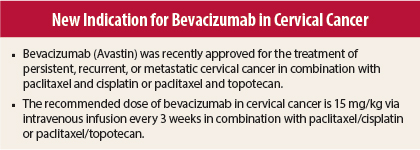In the Clinic provides overviews of novel oncology agents, addressing indications, mechanisms, administration recommendations, safety profiles, and other essential information needed for the appropriate clinical use of these drugs.
On August 14, 2014, bevacizumab (Avastin) was approved for the treatment of persistent, recurrent, or metastatic cervical cancer in combination with paclitaxel and cisplatin or paclitaxel and topotecan.1,2 Updated labeling includes changes in warnings and precautions.
Supporting Trial
Approval is based on the results of a phase III 2×2 factorial trial in which 452 patients with persistent, recurrent, or metastatic disease were randomly assigned to receive bevacizumab plus chemotherapy consisting of paclitaxel/cisplatin or paclitaxel/topotecan (n = 277) or chemotherapy alone (n = 225).2,3 Patients had a median age of 48 years, Gynecologic Oncology Group performance status of 0 (58%) or 1 (42%), 80% had received prior radiation therapy, and 74% had received prior chemoradiation therapy.
Median overall survival was significantly longer with bevacizumab plus chemotherapy vs chemotherapy alone (16.8 vs 12.9 months, hazard ratio [HR] = 0.74, P = .013). There was no significant difference in overall survival between groups receiving paclitaxel/topotecan with or without bevacizumab (n = 223) vs paclitaxel/cisplatin with or without bevacizumab (n = 229; median 13.3 vs 15.5 months, HR = 1.15, P = .23), but hazard ratios were similar with the addition of bevacizumab to both paclitaxel/cisplatin (HR = 0.72, 95% confidence interval [CI] = 0.51–1.02) and to paclitaxel/topotecan (HR = 0.76, 95% CI = 0.55–1.06). The latter findings suggest that bevacizumab plus paclitaxel/topotecan is an acceptable alternative for women with advanced cervical cancer who are not candidates for platinum therapy.
How It Works
Bevacizumab is a recombinant humanized monoclonal IgG1 antibody that binds vascular endothelial growth factor (VEGF) and prevents interaction of VEGF with its receptors (Flt-1 and KDR) on the surface of endothelial cells. Inhibition of this interaction results in inhibition of endothelial cell proliferation and new blood vessel formation in in vitro models of angiogenesis.
How It Is Given
The recommended dose of bevacizumab in cervical cancer is 15 mg/kg via intravenous infusion every 3 weeks in combination with paclitaxel/cisplatin or paclitaxel/topotecan.
The bevacizumab-plus-chemotherapy regimens used in the supporting trial, repeated every 21 days, were: intravenous paclitaxel at 135 mg/m2 over 24 hours on day 1 and intravenous cisplatin at 50 mg/m2 plus bevacizumab on day 2; paclitaxel at 175 mg/m2 over 3 hours on day 1 and cisplatin at 50 mg/m2 plus bevacizumab on day 2; paclitaxel at 175 mg/m2 over 3 hours plus cisplatin at 50 mg/m2 plus bevacizumab on day 1; and paclitaxel at 175 mg/m2 over 3 hours plus bevacizumab on day 1 and topotecan at 0.75 mg/m2 over 30 minutes on days 1 to 3.
There are no recommended dose reductions for bevacizumab. Treatment should be discontinued for gastrointestinal perforation or fistula formation involving an internal organ, wound dehiscence or wound healing complications requiring medical intervention, serious hemorrhage, severe arterial thromboembolic events, life-threatening (grade 4) venous thromboembolic events including pulmonary embolism, hypertensive crisis or hypertensive encephalopathy, posterior reversible encephalopathy syndrome, and nephrotic syndrome.
Treatment should be temporarily suspended ≥ 28 days prior to elective surgery and for severe hypertension not controlled with medical management, moderate to severe proteinuria, and severe infusion reactions. Treatment should not be started for ≥ 28 days after surgery and until wound healing is complete. Bevacizumab should not be given to patients with serious hemorrhage or recent hemoptysis.
Safety Profile
The most common adverse events of any grade in patients receiving bevacizumab and chemotherapy and occurring with a frequency ≥ 5% greater vs the chemotherapy-alone group were fatigue (80% vs 75%), decreased appetite (34% vs 26%), hypertension (29% vs 6%), and hyperglycemia (26% vs 19%). The most common grade 3 or 4 adverse events were fatigue (14.2% vs. 9.9%), abdominal pain (11.9% vs. 9.9%), hypertension (11.5% vs 0.5%), urinary tract infection (8.3% vs 6.3%), and thrombosis (8.3% vs 2.7%). GI perforation occurred in 3.2% of patients receiving bevacizumab and gastrointestinal-vaginal fistulae occurred in 8.2% of bevacizumab patients vs 0.9% of chemotherapy-alone patients. All cases of GI perforation and GI-vaginal fistulae occurred in patients who had received prior pelvic radiation. Other grade 3 or 4 adverse events that were more common in patients receiving bevacizumab included hemorrhage, proteinuria, and wound healing complications.
Bevacizumab carries boxed warnings for gastrointestinal perforation, surgery and wound healing complications, and hemorrhage (including severe or fatal hemorrhage, hemoptysis, gastrointestinal bleeding, central nervous system hemorrhage, and vaginal bleeding). It also carries warnings/precautions for gastrointestinal perforation or fistula and nongastrointestinal fistula, arterial thromboembolic events, venous thromboembolic events, hypertension, posterior reversible encephalopathy syndrome, proteinuria, infusion reactions, and ovarian failure.
Patients must undergo routine monitoring of blood pressure and urine protein. Women of reproductive potential must be informed of the risk of ovarian failure.
Report Adverse Events
Health-care professionals should report all serious adverse events suspected to be associated with the use of any medicine or device to FDA’s MedWatch Reporting System by completing a form online at www.fda.gov/medwatch/report.htm, by faxing (800-FDA-0178), by mailing the postage-paid address form provided online, or by telephone (800-FDA-1088). ■
References
1. U.S. Food and Drug Administration: Bevacizumab solution. Available at www.fda.gov/Drugs/InformationOnDrugs/ApprovedDrugs/ucm410128.htm.
2. AVASTIN® (bevacizumab solution for intravenous infusion) prescribing information, Genentech, Inc, August 2014. Available at www.accessdata.fda.gov/drugsatfda_docs/label/2014/125085s301lbl.pdf.
3. Tewari KS, Sill MW, Long HJ III, et al: Improved survival with bevacizumab in advanced cervical cancer. N Engl J Med 370:734-743, 2014.


